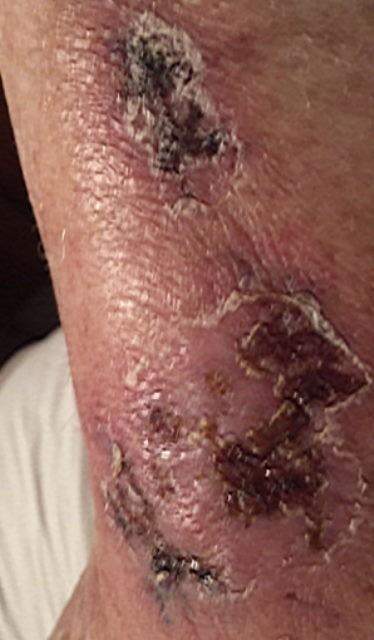A woman saw complete recovery from her decade-long painful ulcers after switching to a whole food plant-based diet.
In 2006, a 63-year-old woman in New Zealand began to notice painful ulcers along her legs. According to the patient, her ulcers would start off as itchy red blotches of varying sizes, and eventually become painful oozing ulcers. Anything from clothes rubbing against her skin to a slight injury could trigger an outbreak. Moreover, the outbreaks would occur every few weeks to months, along with swollen feet.
However, it wasn’t until 2013 that doctors figured out what was wrong. A skin biopsy revealed her diagnosis, livedoid vasculopathy. This rare, chronic vascular disorder is characterized by painful and persistent ulceration of the lower limbs. However, ulcers can also occur in places other than the leg or foot. Although the exact mechanism is unclear, researchers believe the condition arises due to the occlusion of blood vessels due to blood clots. The restricted blood supply results in necrosis and ulceration of the overlying skin. The condition most commonly affects middle-aged women. There is currently no cure for the condition; treatments help alleviate symptoms such as pain and ulceration.
Although compression stockings helped manage the 63-year-old’s swelling and ulcers, they would return once she stopped wearing them. Moreover, despite 10 years of using ibuprofen for pain relief, sometimes with codeine, the patient saw no difference in her symptoms. Thus, desperate to find a relief, she switched to a whole food plant-based (WFPB) diet in 2016 on her doctor’s recommendation.
A WFPB diet includes all vegetables, fruits, legumes, grains, herbs and spices. High-fat plant foods like avocado and coconut are limited. Meat, dairy, eggs, fried foods, heavily processed foods and all refined oils are excluded.
Study authors (BMJ Case Reports)

Complete Recovery Within a Year
The doctor’s recommendation was based on the assumption that the diet change would improve the blood flow. Within a month of the switch, the patient noticed her lesions healing, and described her symptoms as ‘less bothersome’. A year later her ulcers had completely disappeared, and she was in remission.
The mechanism is not completely clear; we speculate that the dietary changes directly affect vascular endothelial health, which in turn affects propensity towards a prothrombotic state
Study authors (BMJ Case Reports)
It is unclear whether the diet change caused improvement in her condition, or just correlated with the patient’s course of the disease. Considering that the condition is associated with bouts of exacerbations and remissions.
However, the patient reported that whenever she strayed from her diet her ulcers would return. Furthermore, in 2019 she took a long break from the plant-based diet and immediately started to experience a resurgence of painful ulcers. Thus, providing evidence for a causal relationship between the remission and the dietary changes. Since the incident, the patient has completely adhered to the plant-based diet and reported no symptoms.
The case report provides evidence that a WFPB diet should be considered as a potential treatment option in those suffering from livedoid vasculopathy. Further research is required to explore the link between the condition and dietary change.
Reference:
Smith M, Wright N, McHugh P, et al. Remission of long-standing livedoid vasculopathy using a whole foods plant-based diet with symptoms recurrent on re-challenge with standard Western diet. BMJ Case Reports CP 2021;14:e237895. http://dx.doi.org/10.1136/bcr-2020-237895




